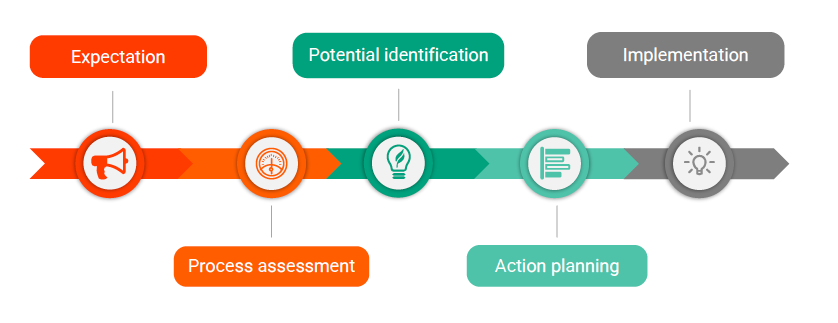Simul+- real experiment
DataLab WestSax no longer accepts new real-world experiments. During the course of the project, a solution-oriented and determined approach gave companies the opportunity to uncover previously undiscovered, data-based value creation potential through Simul⁺ real-world experiments and create added value for them.
Potential analysis

Companies often lack concrete data usage and implementation ideas. A lack of resources or insufficient trust are examples of barriers that prevent many SMEs from using existing data as efficiently as possible. Based on this, a potential analysis was carried out in the company at the beginning, which was completely free of charge for the participating companies due to the funding of the project as part of the Simul+ initiative. The project team analyzed the entire business process chain for possible starting points for improvement measures.
Each potential analysis began with a quick check. The aim was to familiarize themselves efficiently with the company’s existing processes and procedures. The quick check was carried out in interviews along the order flow with pre-defined employees. In addition to the interviews, we also recorded the existing IT and data basis. This served as the basis for our joint work. This was followed by the development of a network of key figures, which provided indicators for the targeted process improvements. Another component of the quick check was the implementation of an initial analysis of the company data. Developed dashboards were used for data visualization and provided information about the current utilization of your machines, the availability of materials, employees and other interesting aspects. The quick check was concluded with a presentation of the results: The processes of the order throughput were documented, initial potential improvements were identified and sorted according to their priority.
The effort involved amounted to 1.5 working days, with two consultants carrying out the data analysis in the company on the first day and the second day being used for a shorter evaluation and presentation of the results. The results of the quick check were then used for a joint fine-tuning of the project objectives in the project plan. Together with you, we derived the first immediate measures that you could immediately apply in your company. In addition to the Quick Wins, Long Term Wins were derived, which were worked on over a longer period of time due to their complexity. During the course of the project, companies also approached our project team with a specific idea for improving potential and we then provided targeted support.
The completion of the Simul⁺ real-life experiment, including all the data-based value creation potential discovered, initiated the immediate implementation of this in their company. DataLab Westsax will continue to exist both as a physical laboratory in Zwickau and as a digital laboratory after the end of the project.
